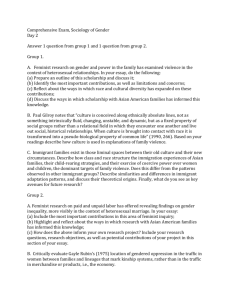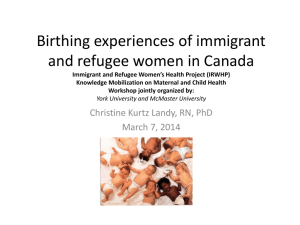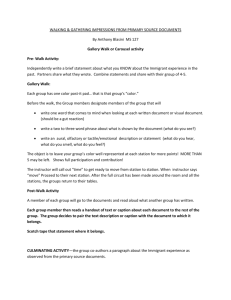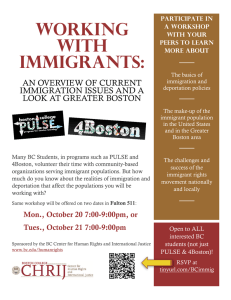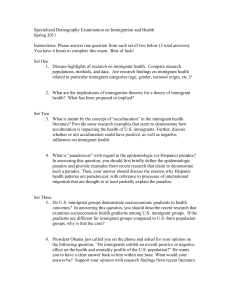R CHILD POLICY
advertisement
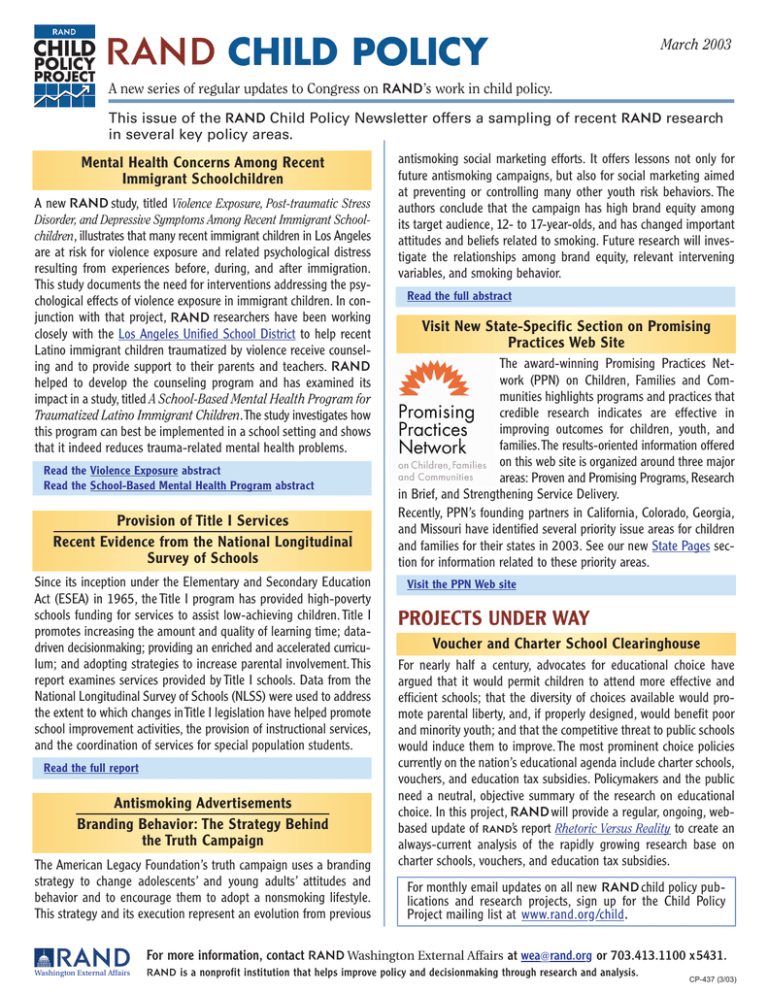
R CHILD POLICY March 2003 A new series of regular updates to Congress on R’s work in child policy. This issue of the R Child Policy Newsletter offers a sampling of recent in several key policy areas. Mental Health Concerns Among Recent Immigrant Schoolchildren A new R study, titled Violence Exposure, Post-traumatic Stress Disorder, and Depressive Symptoms Among Recent Immigrant Schoolchildren, illustrates that many recent immigrant children in Los Angeles are at risk for violence exposure and related psychological distress resulting from experiences before, during, and after immigration. This study documents the need for interventions addressing the psychological effects of violence exposure in immigrant children. In conjunction with that project, R researchers have been working closely with the Los Angeles Unified School District to help recent Latino immigrant children traumatized by violence receive counseling and to provide support to their parents and teachers. R helped to develop the counseling program and has examined its impact in a study, titled A School-Based Mental Health Program for Traumatized Latino Immigrant Children. The study investigates how this program can best be implemented in a school setting and shows that it indeed reduces trauma-related mental health problems. Read the Violence Exposure abstract Read the School-Based Mental Health Program abstract Provision of Title I Services Recent Evidence from the National Longitudinal Survey of Schools Since its inception under the Elementary and Secondary Education Act (ESEA) in 1965, the Title I program has provided high-poverty schools funding for services to assist low-achieving children. Title I promotes increasing the amount and quality of learning time; datadriven decisionmaking; providing an enriched and accelerated curriculum; and adopting strategies to increase parental involvement. This report examines services provided by Title I schools. Data from the National Longitudinal Survey of Schools (NLSS) were used to address the extent to which changes in Title I legislation have helped promote school improvement activities, the provision of instructional services, and the coordination of services for special population students. Read the full report Antismoking Advertisements Branding Behavior: The Strategy Behind the Truth Campaign The American Legacy Foundation’s truth campaign uses a branding strategy to change adolescents’ and young adults’ attitudes and behavior and to encourage them to adopt a nonsmoking lifestyle. This strategy and its execution represent an evolution from previous R Washington External Affairs R research antismoking social marketing efforts. It offers lessons not only for future antismoking campaigns, but also for social marketing aimed at preventing or controlling many other youth risk behaviors. The authors conclude that the campaign has high brand equity among its target audience, 12- to 17-year-olds, and has changed important attitudes and beliefs related to smoking. Future research will investigate the relationships among brand equity, relevant intervening variables, and smoking behavior. Read the full abstract Visit New State-Specific Section on Promising Practices Web Site The award-winning Promising Practices Network (PPN) on Children, Families and Communities highlights programs and practices that credible research indicates are effective in improving outcomes for children, youth, and families.The results-oriented information offered on this web site is organized around three major areas: Proven and Promising Programs, Research in Brief, and Strengthening Service Delivery. Recently, PPN’s founding partners in California, Colorado, Georgia, and Missouri have identified several priority issue areas for children and families for their states in 2003. See our new State Pages section for information related to these priority areas. Visit the PPN Web site PROJECTS UNDER WAY Voucher and Charter School Clearinghouse For nearly half a century, advocates for educational choice have argued that it would permit children to attend more effective and efficient schools; that the diversity of choices available would promote parental liberty, and, if properly designed, would benefit poor and minority youth; and that the competitive threat to public schools would induce them to improve. The most prominent choice policies currently on the nation’s educational agenda include charter schools, vouchers, and education tax subsidies. Policymakers and the public need a neutral, objective summary of the research on educational choice. In this project, R will provide a regular, ongoing, webbased update of R’s report Rhetoric Versus Reality to create an always-current analysis of the rapidly growing research base on charter schools, vouchers, and education tax subsidies. For monthly email updates on all new R child policy publications and research projects, sign up for the Child Policy Project mailing list at www.rand.org/child. For more information, contact R Washington External Affairs at wea@ rand.org or 703.413.1100 x 5431. R is a nonprofit institution that helps improve policy and decisionmaking through research and analysis. CP-437 (3/03)

